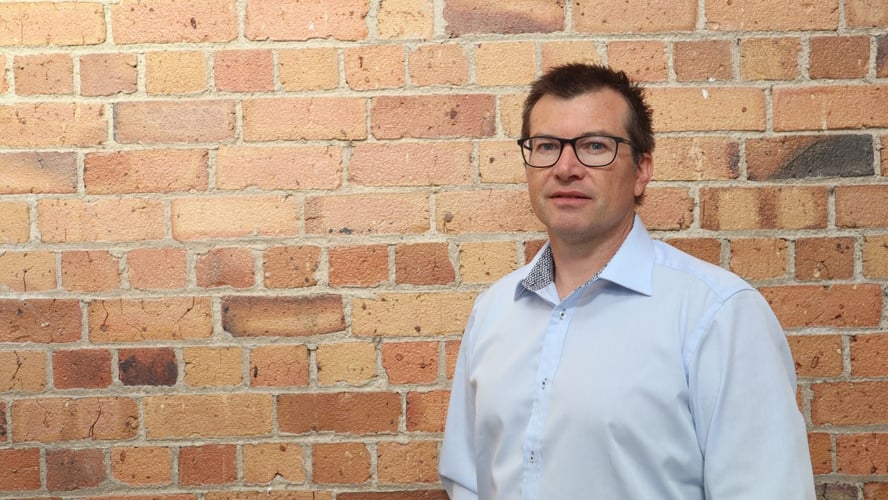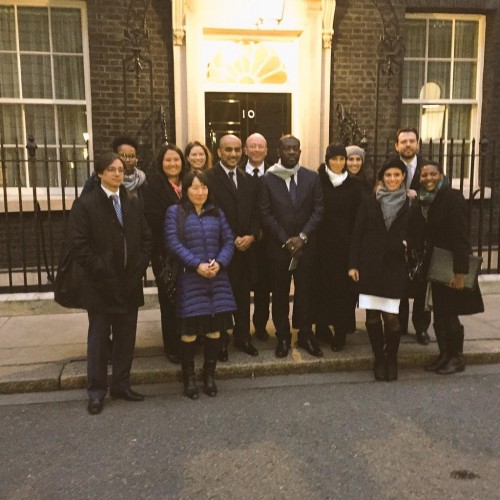

by Andy Hamilton, February 2015
I have just finished a week in London as a guest of the Foreign Office of the United Kingdom with 13 others from politics, community and business from a highly diverse group of countries.
Always difficult to understand in these situations, why you were chosen and how you relate to the other participants, so thought I would share the learnings on the journey both from the people we are exposed too and each other ….I am doing this as much to trap my own learnings and reflections, but also to honour the UK government for giving me this great opportunity and my fellow participants who I have taken inspiration, friendship and admiration from.
First up, here is a bit about the UK International Leaders Programme which now has 90 alumni across ten programmes – it was originally created by William Hague after he experienced a similar programme in Japan earlier in his career:
- The International Leaders Programme is designed to forge links with future international leaders from around the world, and to offer participants a unique insight into the UK.
- UK diplomatic missions around the world were asked to nominate exceptional emerging leaders from their host countries to participate in the programme.
- The programme lasts between seven and ten days. The groups are drawn from a variety of countries (including one participant from the UK) and backgrounds (politics, government, the media and civil society[1], business).
- It features discussions and debates on important challenges that the UK and other countries are facing, and the different ways in which we are dealing with them.
- After the week-long group programme, participants have an optional individual two-day programme of meetings and visits in the UK, designed specifically with individual’s input and particular interests in mind.
So who was on the programme?
Countries represented included – South Africa, Ghana, Angola, Colombia, Chile, Mexico, America, Japan, Peru, UK and New Zealand. We had politicians from Senators, to leaders of opposition parties and people standing in their next elections; we had executives who worked in Government roles such as digital & climate change experts to foreign office specialists and in campaigns for Presidents of their country; we had ‘campaigners’ for better communities involved in human trafficking/human rights and conflict; we had executives who were representatives of their industries; journalists and media experts; academics, entrepreneurs and myself, a business guy for small business and entrepreneurs. The ages ranged from 29 in the young and me as the grand-daddy at 46. The split of the 14 was 8 women and 6 men.
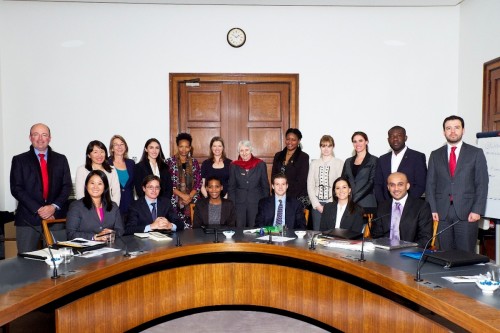
Official photo with a couple of our speakers on day 1
What was the schedule?
It was a collection of discussions and visits which was very interactive, reflective and lots of travel around and across London. Broadly the themes of the week revolved around the role of Government & civil society, the economy and UK exemplars of initiatives that gave us a great exposure. See the appendix for a bit more detail.
My reflections from the week …..
Lets start with the high level and then move into a bit more detail ….
- Systems matter – whether you are talking infrastructure, the country, community, government or business; you get more out these if you have great systems. England appears to have some outstanding systems.
- Individuals matter – systems alone are not enough, having an open society that enables people to be rock-stars and make a difference is critical.
- Micro or on the ground leadership & action is critical – linked to the systems & people, you still need people ‘walking the street’ making a difference; macro alone does not change societies.
- Value for money models are more important than ever – it is more expensive than ever to fund our society, and Governments particularly in times of austerity need communities to find ways to self-fund their activities.
- The widening gap in society - whether that is driven by immigration, diversity or equity, the outcome and risk is a massive issue for the world, disaffection of people that leads to terror and more. There appears to be an accelerating of this and clear consequences that bode badly for modern society if not addressed.
- Plans matter – to coin a phrase from Zero to One[2] it is great to be optimistic and if you don’t have a plan and focus in place, you will end up with sub-optimal outcomes.
We also got to go to some amazing places..
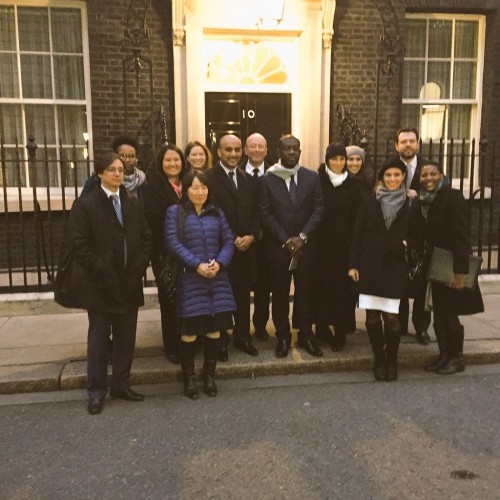
No. 10 Downing Street
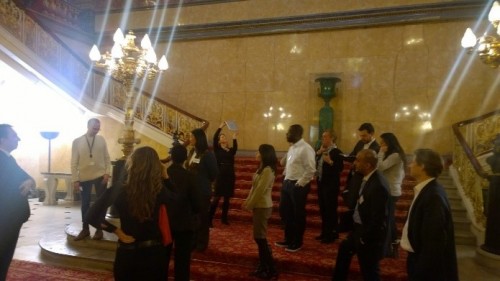
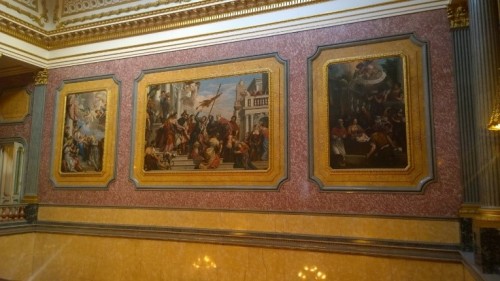
Lancaster House
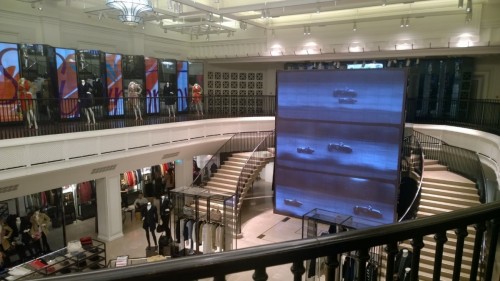
Burberry on Regent Street was a mix of old world and new tech/social
If you drew it down another level, from the visits I have created a few thoughts ….
- There is a depth of thinking & wisdom in England – that is quite profound.
- There is a very strong ‘civil society’ with strong partnerships that enables leverage and support of the Government to improve outcomes for society.
- The system of ‘government’ is incredibly strong with checks & balances within government and from civil society – when you couple this with the depth of thinking & wisdom – it creates a great environment for good decision making.
- Stratification of society is exasperating and not acknowledged[3].
- Immigration into the UK in ‘statistics’ at 5-6% per annum does not seem out of balance, with ½ of this from the EU, however you just have to visit shops and retail in London to see that almost all are are not English people serving, replaced by Europeans[4] - anecdotally, the English say their people do not want to do these jobs? So where are they going because employment has not grown by much?
- There are a significant number of common issues affecting countries from the participants on the programme, with differing starting points and solution sets.
- London has ‘gone off the richter scale’ in infrastructure; quite unbelievable the investment that is going on; and how significantly improved the public transport system is versus 5 and 10 years ago.
- Housing is a massive issue, just like many other countries. Social housing is much more developed in the UK than other countries.
- Terrorism, terror is everywhere you look – everywhere, it is almost just accepted as part of everyday life, what has this world come to? Interestingly for our South American & African colleagues, that was normal life too.
- When you peel back the layers of the onion, I am sure there will be differing views and further issues that conflict with some of my observations.
- The UK struggles with engaging with established SMEs, almost invisible from our visits – focus on Government, Corporate & Startups, but SMEs are just left to do their thing.
- Culturally – the UK people continue to be very self-effacing which is endearing to New Zealanders.
What were some of the challenges that our group identified in our discussions ….
- People issues – inequality, immigration, integration of communities, identity politics
- Financing the Economy – how do you fund the economy, when infrastructure investments are so high and austerity measures are in place.
- UK relationship with the external world – prime being the EU and then also how it relates to places like Africa and South America which do not seem to have a lot of focus
- National security from terror.
What a fantastic experience – not only the content, but the time getting to know some extraordinary people doing special things. Very lucky.
We even found a place that does Flat Whites – thanks Allpress!
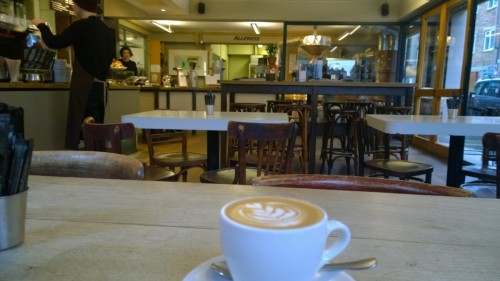
We also helped some of the participants get back home safely with their Fly One Above.
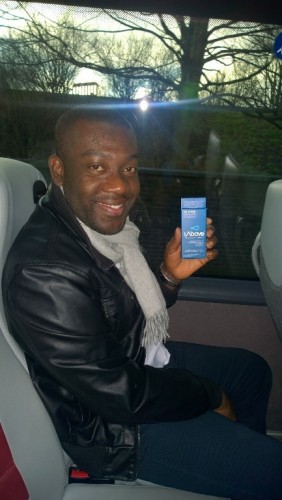
Appendix
Break-down of the people we met during the programme …
- The business of government and civil society
- Baroness Armink Helic – Member of the House of Lords; Sir Paul Nurse – President of the Royal Society & Director, Francis Crick Institute; Baroness O’Neill – Member of the House of Lords; Janet Hills – Chair of the Metropolitan Black Police Association
- The Rt Hon Hugo Swire MP, Minister of State at the Foreign and Commonwealth Office; The Rt Hon Sir Richard Ottaway MP – Chair Foreign Affairs Committee; The Rt Hon Sajid Javid MP – Secretary of State for Culture, Media and Sport
- Cyber Crime – tour and discussion at the National Crime Agency with Dr Jamie Saunders, Director of the National Cyber Crime Unit
- No 10 Downing Street – visit, discussion with Ms Nicola Pollitt, Assistant Private Secretary for Foreign Affairs – how the ‘business’ of Downing Street operates
- Dagenham & Barking – visit to a London Borough, meeting community members including Dr Trevor Mwamba, Rector of Barking, Darren Rodwell, Leader of the Council of Barking & Dagenham, Pastor Obi Onyeabor, lader of the Dagenham Food Bank, Jeremy Grint, Director for Regeneration of Barking, Dagenham
- The economy
- Mr Mark Carney – Governor of the Bank of England
- UK exemplars
- Liverpool Football Club Foundation - Ms Andrea Cooper
- The Olympic Legacy – visit to the Olympic Legacy Corporation in Stratford with Paul Brickell – Exec Director, Regeneration
- BBC World Service Group – tour of main BBC campus and discussion with Ms Francesca Unsworth, Director BBC World Service Group & Ms Lilian Landor – Controller, Languages BBC World Service Group
- Burberry Group Place – visit to their Regent Street Store and HQ with Ms Claire Abeille, Director of Strategic Communications & John Smith, COO & Exec Team Members
- Kew Gardens – visit to Kew with Richard Deverell, Director Royal Botanical Gardens and his team.
And just because, there was a whole load more streams of consciousness as we went about our week …
- Video conferencing is broken world-wide unless you are a large corporate / government organisation who has point-to-point and can afford the hundreds of thousands of dollars – yes, Skype works mostly, but as soon as you bring multi-party it is hopeless – if someone can solve this, it seems like a big opportunity – VC needs to be democratized.
- Auto translation is required of social media streams – if we want to live in and participate in a global world, then we need to understand what we are saying and sharing – for our International Leaders groups we have many different languages, and naturally each person tweets and posts in their home language – that creates a massive barrier in engagement – why can’t I have a setting that auto translates any non-English tweets into English and vice-versa?
- Offline social – when you travel, it costs exorbitant amounts for roaming, unless you have fixed and capped like NZ; but when you take photos and want to share moments the moment is there and then lost – so we need the ability to have offline posting for Twitter, Facebook, Wei Chat.
- Our languages are overlapping – so prevalent in New York and London – with people so much more mobile, the languages and accents seem to be on converging paths.
- Great countries seem to embrace immigration and integration of peoples - ‘Great Britain never put walls in front of me’ & ‘trust the people’.
- Cause and purpose driven people can have an extraordinary place and impact on society, even more so when there is no burning platform for change – ‘frankly, individuals matter’. Easier to get change driven when there is a burning platform, when there is not, it is the individuals that create the momentum.
- Protecting the people in our society, does it start and end with democracy? No, there are three elements required before this to enable a just and well-functioning society
- Order [why people like tyranny rather than anarchy]
- Rule of law
- Respect and the elementary rights of the individual [freedom of speech, freedom from persecution]
- 2015 represents the 820th anniversary of the signing of the Magna Carte!
- England has history, is old but is also embracing new ideas, just look at the zany architecture in London. The Bank of England is also a good example – 119 Governors so far, 320 years old, was founded to promote the good of the people. Significant shift in powers and focus with the most recent crash, the bank taking on much more responsibility but acknowledging that this comes with responsibility to bring transparency & accountability.
- Method and process for appointment of politicians for roles such as Chairs of Select Committees is rigorous and voted on; not decided by one person or party.
- From economic perspective – England is concerned about European stagnation & its own debt levels, noting that UK households have actually deleveraged by 20%. The Government debt actually has a negative 1% impact on the economy currently. Immigration in the UK is not actually that big – at 5-6% of the population, half coming from the EU. Housing has a 2x supply challenge – massive issue. If the Fed goes about strengthening/tightening then interest rates will increase, could lead to variability, boom/bust of emerging economies. Mobile banking is creating a great opportunity for innovation in the market. Brittain continues to look at ways to get better value for money, austerity programmes continue and all society groups we met are working on how to ‘fund’ more of the activities themselves.
- Equality comes up in many places – for example, compare the riches of London vis-à-vis Barking & Dagenham. So close to each other, so world’s apart, it just does not seem right – ‘We are ten miles from Westminster & could be one million miles away”. Also, linking into diversity and poverty – how to address this especially in times of austerity. Clearly the solution and focus is to enable empowerment of people to look after themselves and community members following with a support network – ‘trying to promote an active citizenry’ – but how do you do this where there is not enough funding or resources available? Whether your politics of poison is left, green, right, liberal – this issue seems to be getting away from society.
- Very cool ‘app’ that Dagenham & Barking had – called ‘Report IT’ – when a person identifies a problem with resources and/or services.
[1] This is a new term for me – ‘civil society’ are those aspects outside of Government that contribute to and enable a better community. Interesting term.
[2] Written by Peter Thiel – a great read.
[3] Interestingly, this is very similar to the US and some of the other countries, with exceptions being countries like Oman.
[4] We actually found the accents very challenging and confusing, with the combo of European and English – maybe there is a significant overlap of accents already underway with the fluidity of people moving cross border in the EU.


